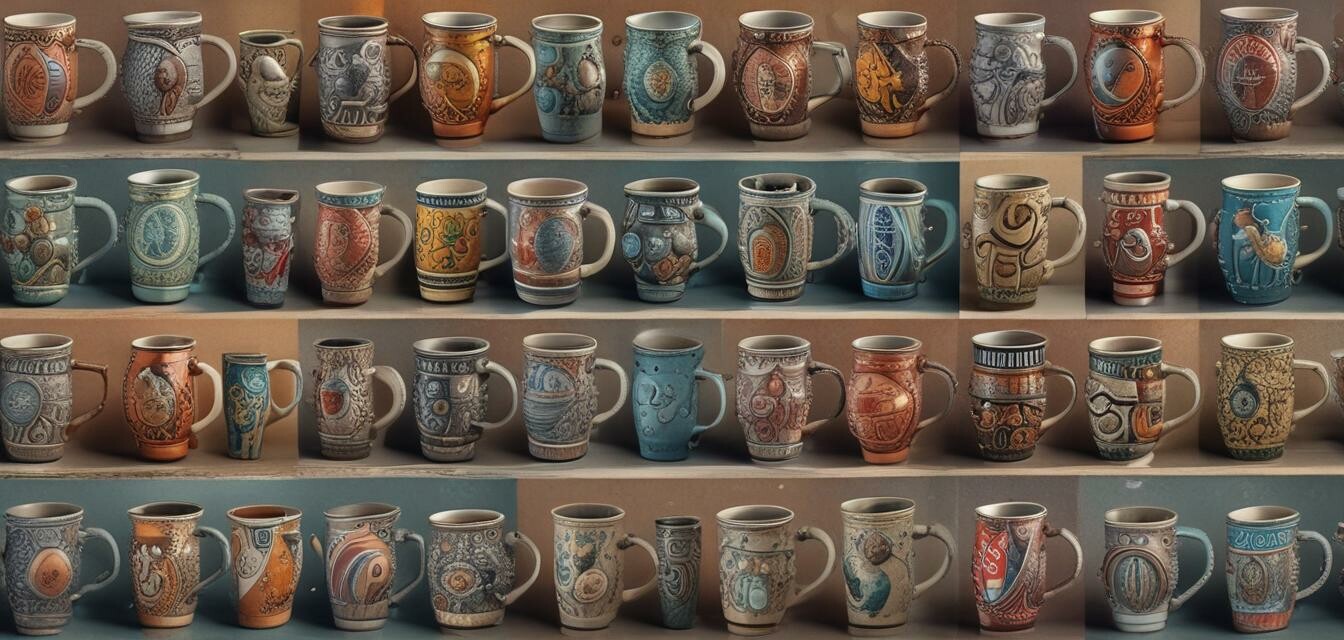
Exploring Cultural Mug Traditions Globally
Key Takeaways
- Mugs are more than just vessels for beverages; they hold cultural significance and traditions.
- Different regions have unique mug designs that reflect their history and lifestyle.
- Understanding these traditions can enhance your appreciation for your favorite budget mugs.
- Popular themes include celebrations, regional pride, and artistic expression.
- Exploring these traditions can inspire your next mug purchase, making it not just functional but meaningful.
Welcome to a deeper dive into the world of mugs! Beyond serving as simple vessels for beverages, mugs often embody the cultural heritage and traditions of the regions they hail from. In this article, we will explore unique mug traditions across various cultures and their corresponding symbolism, helping you appreciate each sip even more.
The significance of mugs in cultural traditions
Mugs are utilized in daily routines all over the world. However, they often play a more profound role in cultural rituals, celebrations, and expressions of personal identity. Let’s delve into how different cultures celebrate their mug traditions:
1. East Asian Teacups
In East Asian countries such as China and Japan, teacups and mugs often represent a vital part of social interactions. Here’s how:
- Chinese Tea Culture: The Chinese tea ceremony emphasizes harmony, respect, and tranquility. Unique mugs crafted from porcelain reflect artistry.
- Japanese Matcha Tradition: The use of handcrafted ceramic mugs enriches the experience of drinking matcha, signifying mindfulness and aesthetics.
2. European Coffee Mugs
Europe boasts a rich coffee culture, with mugs often reflecting historical generations:
- Italian Espresso Mugs: In Italy, espresso mugs symbolize the fast-paced lifestyle of city life, often seen in cafés serving quick shots of espresso.
- Swedish Fika Mugs: Fika, the Swedish coffee break, emphasizes community and connection, where uniquely designed mugs are often shared with pastries.
3. African Handmade Ceramics
Africa is known for its vibrant art scenes, reflected in its mug designs:
- Kenyan Kanga Mugs: Mugs often feature colorful fabric patterns that symbolize unity and companionship when sharing drinks together.
- Moroccan Tea Glasses: Although technically not mugs, these glasses are integral to the Moroccan tradition of sharing mint tea, showcasing exquisite designs.
4. North American Customized Mugs
In North America, personalized mugs are increasingly popular:
- Customizable Coffee Mugs: Many Americans cherish personalized mugs, promoting individuality and allowing for unique artistic expressions.
- Seasonal Mugs: Holiday-themed mugs are commonplace, lending a festive touch to shared moments during special occasions.
Comparison of cultural elements in mug designs
| Region | Common Materials | Symbolism | Popular Occasions |
|---|---|---|---|
| East Asia | Porcelain, Ceramic | Harmony, Respect | Tea ceremonies, Family gatherings |
| Europe | Stoneware, Earthenware | Cultural heritage, Socialization | Coffee breaks, Seasonal festivals |
| Africa | Clay, Glass | Unity, Community | Social gatherings, Celebrations |
| North America | Porcelain, Ceramic, Customizable materials | Individuality, Expression | Holidays, Personalized gifts |
Trends and innovations in mug designs
As the world evolves, so does the art of mug making. Here are some trends we’re seeing in the industry:
- Eco-friendly Materials: Many manufacturers are now focusing on sustainable materials, leading to eco-friendly mugs that promote environmental awareness.
- Minimalist Designs: Sleek and simplistic mugs that cater to modern aesthetics are increasingly popular.
- Artisan Collaborations: Artists from various cultures are collaborating to create unique mug designs that pay homage to traditional craftsmanship.
- Themed Collections: Seasonal or culturally themed mugs are making waves, allowing collectors to celebrate special moments and traditions.
Why understanding cultural mug traditions matters
Grasping the significance of mug traditions enriches our daily lives. Here’s why it is beneficial:
- Appreciation for Craftsmanship: Learning about traditions helps you appreciate the skill and time that goes into creating these mugs.
- Enhanced Experience: Understanding what a mug symbolizes can elevate your drinking experience, making it more personal.
- Informed Choices: This knowledge empowers you to choose mugs that resonate with you, whether it’s a cultural reflection or aesthetic appeal.
Tips for finding your next mug
- Look for local artisans who create handmade mugs that reflect their cultural significance.
- Explore collections that tell a story, connecting you to the traditions behind the mugs.
- Consider attending local craft fairs or marketplaces to discover unique options.
- Don’t hesitate to customize your mug to add a personal touch reflecting your identity.
Pros
- Rich cultural significance adds value to the drinking experience.
- Unique designs promote artistic expression and personality.
- Understanding traditions can enhance social connections over shared experiences.
Cons
- Some culturally significant mugs may come with a higher price tag.
- Limited availability in specific markets due to niche craftsmanship.
- Not all mugs may be suitable for everyday usage based on their design.
In conclusion, mugs transcend their basic function; they encapsulate traditions, stories, and cultural identities. Whether you drink from a cup adorned with local artwork or a personalized mug that reflects your interests, understanding these cultures adds richness to the experience. For more information, check out our [Buying Guides](/blog/buying-guides) section for further insights into selecting the best budget mugs.



